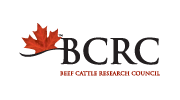Evidence-based prebiotic and probiotic solutions for improving gut health and feed efficiency in cattle
| Project Code: | FDE.14.17 |
| Completed: | In Progress. Results expected in March 2022. |
Project Title:
Evidence-based prebiotic and probiotic solutions for improving gut health and feed efficiency in cattle
Researchers:
Wade Abbott Ph.D. and Alisdair Boraston Ph.D. wade.abbott@agr.gc.ca
Wade Abbott Ph.D. (Agriculture Agri-Food Canada Lethbridge); Alisdair Boraston Ph.D. (University of Victoria); Doug Inglis Ph.D. and Dallas Thomas (Agriculture Agri-Food Canada Lethbridge); John Kastelic DVM (University of Calgary); Erasmus Okine Ph.D. (University of Lethbridge); Richard Uwiera Ph.D. (University of Alberta)
Background:
Prebiotics are feed ingredients that cattle can’t digest but bacteria can. Probiotics are bacteria that have a benefit for cattle. Feeding prebiotics along with probiotics is called synbiotics. Pre- and probiotics have been on the market for years and some have shown promise for monogastrics. There is less research available to show that they provide consistent benefits for cattle. Past Beef Science Cluster funded research has been developing science-based pre-, pro-, and synbiotic strategies.
Objectives:
To isolate and characterize rumen bacteria that metabolize yeast mannan and analyze prebiotic-probiotic interactions in an artificial rumen and an artificial intestine. Researchers will also determine the effects of synbiotics on feed digestibility and production in ruminants
What They Will Do:
Rumen bacteria will be batch cultured with yeast mannan, Bio-Mos and dried distillers’ grains with solubles (DDGS) for 3 months to identify those that grow best and metabolize it most effectively. Population growth, gene expression, and bacterial interactions will be monitored, and genes coding for yeast-mannan degrading enzymes will be identified.
Bacteria that grow best in batch cultures will be fed yeast mannan, Bio-Mos and DDGS in an artificial rumen. Metabolic outputs will be measured, and metagenomics will be used to monitor changes in the microbiome over time. Bacteria that degrade yeast mannan will be isolated, cultured, and sequenced to identify the enzymes responsible. Similar experiments will be conducted in an artificial intestine using bacteria collected from duodenally cannulated cattle.
Ruminally and duodenally cannulated cattle will be fed Bio-Mos, DDGS or a control diet. If yeast mannan degrading bacteria aren’t stimulated in the rumen, bacteria identified in previous trials will be added. Rumen and duodenal pH and digestibility measures will be collected. The rumen, duodenum and fecal microbiome will be characterized, and probiotic-prebiotic interactions will be examined.
Performance effects of yeast mannan and yeast-mannan degrading bacteria will be studied in ruminants fed yeast mannan degrading probiotics and DDGS or Bio-Mos. Productivity, rumen function, animal health, and the rumen microbiome will be analyzed.
Implications:
This project will enhance our understanding of the interactions that occur between feed, rumen microbes, and the animal; this will help improve animal performance while minimizing digestive disturbances and diet-related animal welfare concerns and help develop effective alternatives to feed additives and growth promotants.








